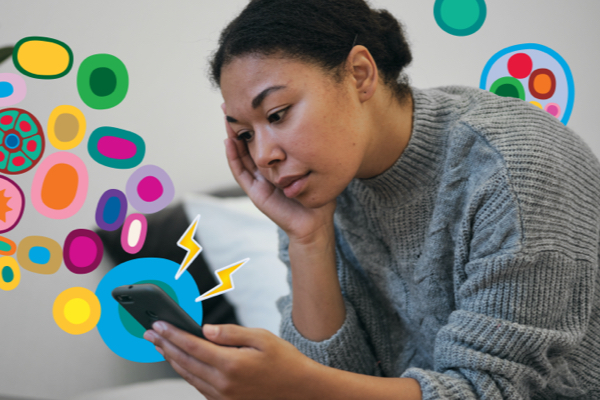Supporting your child’s mental health

As a parent or carer, nobody knows your child better than you. You notice the small moments as well as the big ones, when they’re not quite themselves or when something’s on their mind, even if they can’t find the words to tell you.
Mental health is part of your child’s overall wellbeing, just like sleep, play and connection. And while it can feel hard to know what to say or when to step in, you’re not alone in figuring it out.
Here are some gentle, practical ways to help care for your child’s mental health, signs to look out for, and where to get help if you need it.
Why early mental health support matters
It’s never too early to build good mental health habits. Around half of all mental health conditions begin before age 14, with attention deficit hyperactivity disorder (ADHD) and anxiety among the most common in children.1, 2
Supporting their emotional development from an early age can help give kids the tools they’ll use through adolescence and beyond. Specifically, supporting mental health in children can help them to:
adapt to change
build healthy relationships
communicate effectively
deal with challenges
express and regulate their emotions.
How to support your child’s mental health
Small, everyday actions can make a big difference to your child’s mental health and wellbeing. Here are five ways to support their emotional development from an early age.
Be a mental health role model
Children often learn by watching how you respond to challenges. Show them it’s okay to feel stressed or overwhelmed. Model healthy ways to cope, like taking deep breaths, going for a walk or talking through a problem. When you’re open about your feelings and actions, it can help children feel safe to do the same.
Spend quality time together
Regular quality time with your child can help them feel safe and supported. Switch off distractions like the TV and do something simple together, like chatting over dinner or walking the dog. It doesn’t need to be long or fancy, just focused time where they feel heard.
Grow the conversation as they do
Mental health conversations should grow with your child. Keep the chat age-appropriate, and adjust how you talk about feelings as they get older.
Connect with your community
Being part of a group can help kids feel they belong and give them emotional support. Encourage them to spend time with their friends, or try local clubs, sports or hobbies like parkrun to help build new social bonds.
Lead a healthy lifestyle
Good food, sleep and movement all support mental wellbeing. These habits can boost mood, improve energy and even help prevent mental health issues from developing.

Signs your child might need mental health support
All kids have their ups and downs. But if you notice these signs for two weeks or more, or if they’re affecting your child’s daily life, it might be time to seek support:
Feeling sad, anxious or hopeless
Avoiding friends, family or usual activities
Difficulty coping with life events
Changes in sleep or appetite
Headaches or stomach aches.
These signs don’t always mean something serious is going on, but it’s important to seek help early just in case.
Talking to your child about mental health
It’s not always easy to talk about mental health with your child. You might worry about saying the wrong thing or making things worse – that’s completely normal. Just try to keep it simple and age-appropriate. What matters most is letting them know you care and that you’re there to listen.
Here are three steps to help you get started.
Choose the right moment
Pick a time when you’re both feeling calm, like during a quiet moment at home or while doing something they enjoy. It’s easier to talk when there’s no pressure.
Keep it simple and gentle
You don’t need to have all the answers. Try a simple question like “You seem a bit quiet, how are you feeling?” or say, “I’m always here if you want to talk.” Let them know it’s okay to feel however they’re feeling
Listen and reassure
If they do open up, thank them for sharing. Stay calm, listen without judgement and let them know it’s okay to talk about difficult feelings.
Ask your child how you can support them, and if they’re not sure, that’s okay. It might be time to talk to your GP together as a first step to seeking more support. They will be able to assess your individual situation and recommend the best next steps for your recovery.

24/7 Medibank Mental Health Support
Medibank health insurance members can chat to a mental health professional about how they feel and ask questions about a range of mental health concerns for themselves or a loved one and get guidance on what they can do next. Chat online or call 1800 644 325 anytime of the day or night, 7 days a week at no extra cost.~
What to do if your child is diagnosed with a mental illness
If your GP or a referred mental health specialist (like a psychologist or a psychiatrist) diagnoses your child with a mental illness, it can bring up lots of emotions for everyone involved: relief, worry, sadness or even guilt. Whatever you’re feeling, you’re not alone, and it’s okay to take things one step at a time.
Start by learning as much as you can about the diagnosis from trusted sources. Your child’s GP, paediatrician or mental health professional can help explain what it means and what treatment or support is available.
Involve your child’s school in their care plan so that your child can get the support they need in the classroom as well.
You don’t need to have all the answers or fix everything straight away. Focus on creating a supportive home environment, sticking to routines where you can and showing your child they’re loved and accepted exactly as they are.
Remember to look after your own mental health as well, especially if you’re feeling anxious, fatigued or overwhelmed. When you get the support you need, you’re better able to support your child.
Where to get help
If your life or someone else’s is in danger, call 000 immediately.
If you’re in distress and need help, call Lifeline on 13 11 14 for 24/7 crisis support.
If you’re looking for additional advice or support and want to talk, there are several free services dedicated to helping children and young adults, as well as their parents or carers.
Medibank health insurance members can chat to a mental health professional about how they feel and ask questions about a range of mental health concerns for themselves or a loved one and get guidance on what they can do next. Chat online or call 1800 644 325 anytime of the day or night, 7 days a week at no extra cost~.
- Kids Helpline offers phone and online counselling for people aged 5–25.
- Parentline offers counselling and support for parents and carers.
- ReachOut offers one on one professional coaching for parents and carers of teens (12–18 years).
- SANE Australia offers phone counselling and online support for people living with a mental illness and their carers.
Remember that help is always available, no matter the situation.
How can we help?
I want to know how my cover supports mental health
I need help and want to talk
Related articles
Things you need to know
1 https://www.healthdirect.gov.au/kids-mental-health
~Some referred services may involve out of pocket costs and waiting periods may apply.
While we hope you find this information helpful, please note that it is general in nature. It is not health advice, and is not tailored to meet your individual health needs. You should always consult a trusted health professional before making decisions about your health care. While we have prepared the information carefully, we can’t guarantee that it is accurate, complete or up-to-date. And while we may mention goods or services provided by others, we aren’t specifically endorsing them and can’t accept responsibility for them. For these reasons we are unable to accept responsibility for any loss that may be sustained from acting on this information (subject to applicable consumer guarantees


